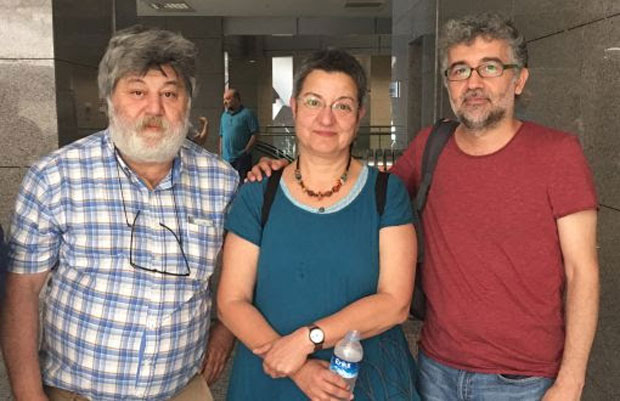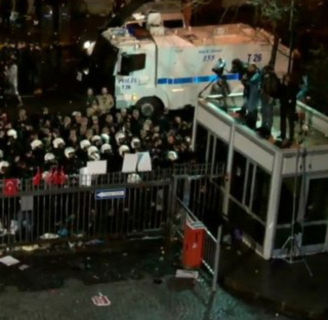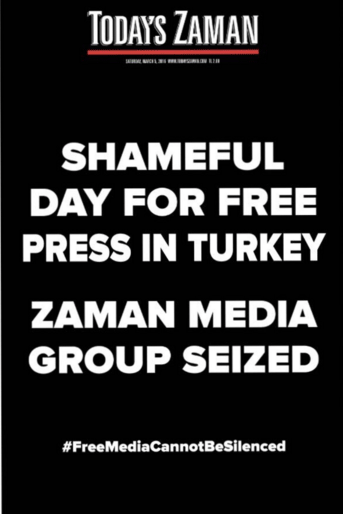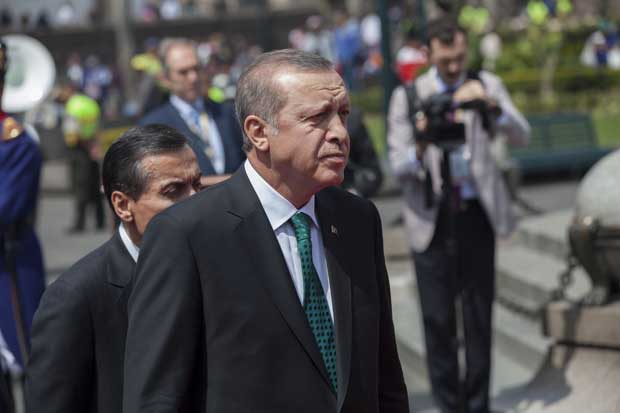22 Jun 2016 | News and features, Turkey, Turkey Uncensored

From left, Ahmet Nesin (journalist and author), Şebnem Korur Fincancı (President of Turkey Human Rights Foundation) and Erol Önderoğlu (journalist at Bianet and RSF Turkey correspondent). (Photo: © Bianet)
I have known Erol Önderoğlu for ages. This gentle soul has been monitoring the ever-volatile state of Turkish journalism more regularly than anybody else. His memory, as the national representative of the Reporters Without Borders, has been a prime source of reference for what we ought to know about the state of media freedom and independence.
On 20 June, perhaps not so surprisingly, we all witnessed Erol being sent to pre-trial detention, taken out of the courtroom in Istanbul in handcuffs.
Charge? “Terrorist propaganda.” Why? Erol was subjected to a legal investigation together with two prominent intellectuals, author Ahmet Nesin, and Prof Şebnem Korur Fincanci – who is the chairwoman of the Turkish Human Rights Foundation – because they had joined a so-called solidarity vigil, as an “editor for a day”, at the pro-Kurdish Özgür Gündem daily, which has has been under immense pressure lately.
This vigil had assembled, since 3 May, more than 40 intellectuals, 37 of whom have now been probed for the same charges. One can now only imagine the magnitude of a crackdown underway if the courts copy-paste detention decisions to all of them, which is not that unlikely.
Journalism has, without the slightest doubt, become the most risky and endangered profession in Turkey. Journalism is essential to any democracy. It’s demise will mean the end of democracy.
Turkey is now a country — paradoxically a negotiating partner with the EU on membership — where journalism is criminalised, where its exercise equates to taking a walk on a legal, political and social minefield.
“May God bless the hands of all those who beat these so-called journalists” tweeted Sait Turgut, a top local figure of AKP in Midyat, where a bomb attack on 8 June by the PKK had claimed 5 lives and left more than 50 people wounded.
Three journalists – Hatice Kamer, Mahmut Bozarslan and Sertaç Kayar – had come to town to cover the event. Soon they had found themselves surrounded by a mob and barely survived a lynch attempt.
Most recently, Can Erzincan TV, a liberal-independent channel with tiny financial resources but a strong critical content, was told by the board of TurkSat that it will be dropped from the service due to “terrorist propaganda”. Why? Because some of the commentators, who are allowed to express their opinions, are perceived as affiliated with the Gülen Movement, which has been declared a terrorist organisation by president Recep Tayyip Erdoğan.
It is commonplace for AKP officials from top down demonise journalists this way. Harrassment, censorship, criminal charges and arrests are now routine.
Detention of the three top human rights figures, the event in Midyat or the case of Can Erzincan TV are only snapshots of an ongoing oppression mainly aimed at exterminating the fourth estate as we know it. According to Mapping Media Freedom, there have been over 60 verified violations of press freedom since 1 January 2016.
The lethal cycle to our profession approaches its completion.
While journalists in Turkey – be they Turkish, Kurdish or foreign – feel less and less secure, the absence of truthful, accurate, critical reporting has become a norm. Covering stories such as the ”Panama Papers” leak — which includes hundreds of Turkish business people, many of whom have ties with the AKP government — or the emerging corruption case of Reza Zarrab — an Iranian businessman who was closely connected with the top echelons of the AKP — seems unthinkable due to dense self-censorship.
Demonisation of the Kurdish Political Movement and the restrictions in the south eastern region has made it an extreme challenge to report objectively on the tragic events unfolding in the mainly Kurdish provinces which have forced, according to Amnesty International, around 500,000 to leave their homes.
Journalism in Turkey now means being compromised in the newsrooms, facing jail sentences for reportage or commentary, living under constant threat of being fired, operating under threats and harassment. A noble profession has turned into a curse.
In the case of Turkey, fewer and fewer people are left with any doubt about the concentration of power. It’s in the hands of a single person who claims supremacy before all state institutions. The state of its media is now one without any editorial independence and diversity of thought.
President Erdoğan, copying like-minded leaders such as Fujimori, Chavez, Maduro, Aliyev and, especially, Putin, did actually much better than those.
His dismay with critical journalism surfaced fully from 2010 on, when he was left unchecked at the top of his party, alienating other founding fathers like Abdullah Gül, Ali Babacan and others who did not have an issue with a diverse press.
Soon it turned into contempt, hatred, grudge and revenge.
He obviously thought that a series of election victories gave him legitimacy to launch a full-scale power grab that necessitated capturing control of the large-scale media outlets.
His multi-layered media strategy began with Gezi Park protests in 2013 and fully exposed his autocratic intentions.
While his loyal media groups helped polarise the society, Erdoğan stiffly micro-managed the media moguls with a non-AKP background — whose existence depended on lucrative public contracts — to exert constant self-censorship in their news outlets, which due to their greed they willingly did.
This pattern proved to be successful. Newsrooms abandoned all critical content. What’s more, sackings and removals of dignified journalists peaked en masse, amounting now to approximately 4,000.
By the end of 2014, Erdoğan had conquered the bulk of the critical media.
Since 2015 there has been more drama. The attacks against the remaining part of the critical media escalated in three ways: intimidation, seizure and pressure of pro-Kurdish outlets.
Doğan group, the largest in the sector, was intimidated by pro-AKP vandalism last summer and brought to its knees by legal processes on alleged “organized crime” charges involving its boss.
As a result the journalism sector has had its teeth pulled out.
Meanwhile, police raided and seized the critical and influential Koza-Ipek and Zaman media groups, within the last 8 months, terminating some of its outlets, turning some others pro-government overnight and, after appointing trustees, firing more than 1,500 journalists.
Kurdish media, at the same time, became a prime target as the conflict grew and more and more Kurdish journalists found themselves in jail.
With up to 90% of a genetically modified media directly or indirectly under the control Erdoğan and in service of his drive for more power, decent journalism is left to a couple of minor TV channels and a handful newspapers with extremely low circulations.
With 32 journalists in prison and its fall in international press freedom indexes continuing to new all-time lows, Turkey’s public has been stripped of its right to know and cut off from its right to debate.
Journalism gagged means not only an end to the country’s democratic transition, but also all bridges of communication with its allies collapsing into darkness.
A version of this article originally appeared in Süddeutsche Zeitung. It is posted here with the permission of the author.

Turkey Uncensored is an Index on Censorship project to publish a series of articles from censored Turkish writers, artists and translators.
8 Jun 2016 | News and features, Turkey, Turkey Uncensored
Nothing could illustrate the course of developments in Turkey better than the case of prosecutor Murat Aydın.
In what was described as a “judicial coup” in critical media, Aydin was one of 3,746 judges and prosecutors, who were reassigned in recent days, an unprecedented move that has shaken the basis of the justice system. Some were demoted by being sent into internal “exile”, some were promoted.
According to daily Cumhuriyet, his pro-freedom stance landed him in the former group.
Aydin’s transgression was to challenge the Turkish Penal Code’s Article 299 — the basis of “insulting the president” cases — in the country’s constitutional court. He argued that Article 299 was unconstitutional and conflicted with the European Convention on Human Rights. He had asked the top court to void the article.
After the reshuffle, he was told he would now be handling cases in Trabzon on the Black Sea coast, clear across the country from İzmir on the Aegean, where he had been working.
“I was exiled because of the decisions I have made and my expressed views,” he told Cumhuriyet. ”The worst part is, there is no authority any longer where we seek these type of sanctions to be checked, where we can challenge unjust acts.”
Meanwhile, another prosecutor, Cevat İslek, who made his name filing charges against journalists on the basis of “insulting the president” was promoted, Cumhuriyet noted, to the position as the deputy chief prosecutor in Ankara.
One wonders how such transfers are perceived by the public. Do Turks notice that the how the president, Recep Tayyip Erdoğan, and his AKP government are seizing control over the domain of expression through the imposition of large-scale punitive measures? Do they notice that this is taking place in defiance of the constitution, which defines the office of the president as being “impartial”?
The accelerated authoritarianism in Turkey — chiefly targeting media, academia and civil dissent — leaves nothing to chance. Though the media sector and its professionals remain top of the list for the president’s persecution, those who are seen as instrumental in filing and judging the court cases against them are also targets.
The issue has raised the alarm levels to new heights. In a recent report a global body of legal experts issued an “orange level” of concern on the state of the judiciary in Turkey, warning, after scrutinising the rising problems, that it is falling into total subordination of the executive.
”The ICJ remains concerned that transfers are being applied as a hidden form of disciplinary sanction and as a means to marginalize judges and prosecutors seen as unsupportive of government interests or objectives,” the Geneva-based International Commission of Jurists (ICJ) wrote in its report, Turkey: the Judicial System in Peril, which was prepared after a long series of talks with anonymous judges and prosecutors, among others.
“Many of those with whom the mission met noted that there are now unprecedented levels of pressure, division, distrust and fear in the Turkish judiciary. There are alarming signs that this has already led to manipulation of the judicial system on political grounds, including to target government opponents or to criminalize and prosecute criticism of the government. Of particular concern, is the high number of prosecutions for offences restricting freedom of expression, in particular for the offence of ‘insulting the president’.”
With the backbone of justice highly infected by partisanship, a “total eclipse” is looming and it becomes much easier to grasp the magnitude of oppression. “Insulting” cases may have risen above 2,000 since last year, but what is happening today is a multifaceted assault on freedom of speech and journalism as a whole.
Media monitoring organisations – Platform for Independent Journalism, Reporters Without Borders and Turkish Trade Union of Journalists – estimate that, now, the portion of media under direct and/or indirect control of the presidential palace and the AKP, is around 90%. This is corroborated by Mapping Media Freedom, which has recorded the litany of cuts against journalism.
The remnant segment of independent journalism operates, under great legal and financial strain, with dailies such as secular Cumhuriyet, liberal Özgür Düşünce, leftist Birgün and Evrensel, and Kurdish Özgür Gündem. On the TV side, the “capture” is even more severe: there are only three channels — Kurdish IMC TV, liberal CanErzincan and secular Halk TV — airing critical content.
But even such a weakened media segment seems to worry the authorities. The most recent meeting of the National Security Council, a powerful body symbolising state authority, ended with the endorsement that the battle against what the AKP sees as the “domestic enemies”, namely the Kurdish Political Movement and what Erdoğan depicts as “parallel structure” Gülenists, will be escalated.
Everybody knows what this refreshed announcement means: the remaining independent outlets will be criminalised by any means necessary. The latest developments indicate that the special office of prosecution on crimes against the constitution is preparing to launch inquiries against a number of outlets, chiefly targeting the Kurdish media. In other words, further closures may be expected to appear on the government’s agenda.
Along with the systematic arrests of more than 12 reporters of Dicle News Agency, which is almost the only source of news on what takes place during “scorched earth” operations in the mainly Kurdish southeastern provinces, the strongest sign on the media clampdown is the legal investigation filed against more than 15 well-known journalists — most of them non-Kurdish — who took part in an act of solidarity, “Chief Editors Vigil”, with the pro-Kurdish daily, Özgür Gündem.
The journalists are expected to be charged with “terrorist propaganda” under Turkey’s anti-terror law, which Erdoğan and the AKP government refuses to revise despite EU demands – a key criteria for visa liberalisation for Turkish citizens.
Nothing, it seems, will suffice to alter the authoritarian course Turkey has been taking and the price journalists and peaceful dissidents are forced to pay rises geometrically.
But nothing seems to stop the tiny-but-tough core of resistant journalists who continue to confront the Orwellian state as it consolidates itself under the nose of the pro-government and subservient media.

Turkey Uncensored is an Index on Censorship project to publish a series of articles from censored Turkish writers, artists and translators.
7 Mar 2016 | Europe and Central Asia, Mapping Media Freedom, News and features, Turkey
 On Friday night, security forces stormed Zaman, the widest-circulating Turkish newspaper. Though many Turkish news outlets studiously avoided covering the raids, the screens of international news channels were full of images of Turkish police using tear gas and water cannon against protestors trying to protect their paper. Particularly striking were the injuries to young women wearing Islamic headgear, the very segment of the community, which the ruling Justice and Development Party (AKP) once vowed to defend.
On Friday night, security forces stormed Zaman, the widest-circulating Turkish newspaper. Though many Turkish news outlets studiously avoided covering the raids, the screens of international news channels were full of images of Turkish police using tear gas and water cannon against protestors trying to protect their paper. Particularly striking were the injuries to young women wearing Islamic headgear, the very segment of the community, which the ruling Justice and Development Party (AKP) once vowed to defend.
The seizure of a news organisation by placing it into court-appointed administration is not trivial. The Zaman group employs some two thousand people, runs a nationwide network of correspondents and puts out an English language daily, Today’s Zaman, which has an international following on the web. It is impossible to imagine a court in any country with the slightest pretension of being democratic acting with such impunity.
The final headline of the independent version of Zaman was that there could be no legal basis for the takeover. Indeed, Article 30 of the Turkish Constitution reads: “A printing house and its annexes, duly established as a press enterprise under law, and press equipment shall not be seized, confiscated, or barred from operation on the grounds of having been used in a crime.” (As amended on May 7, 2004; Act No. 5170)”
 It is no secret that Zaman demonstrated fidelity to the movement associated with the exiled cleric, Fethullah Gülen. The paper once supported the rise of AKP but in recent years has been a bitter critic. The legal document, which placed Zaman’s parent company into court-appointed administration, relies on the testimony of an anonymous witness who maintains that the editorial policy was dictated by what it calls the Fethullah Terror Organisation (FETÖ in its Turkish acronym). This in turn is guilty of conspiring with the outlawed Kurdistan Workers Party (PKK). It is enough to point out that the existence of FETÖ is at best hearsay, at worst the invention of subeditors in the pro-government press – never mind that Zaman itself once took a more hawkish line towards the PKK than the government itself.
It is no secret that Zaman demonstrated fidelity to the movement associated with the exiled cleric, Fethullah Gülen. The paper once supported the rise of AKP but in recent years has been a bitter critic. The legal document, which placed Zaman’s parent company into court-appointed administration, relies on the testimony of an anonymous witness who maintains that the editorial policy was dictated by what it calls the Fethullah Terror Organisation (FETÖ in its Turkish acronym). This in turn is guilty of conspiring with the outlawed Kurdistan Workers Party (PKK). It is enough to point out that the existence of FETÖ is at best hearsay, at worst the invention of subeditors in the pro-government press – never mind that Zaman itself once took a more hawkish line towards the PKK than the government itself.
According to reports reaching P24, the prosecutor struggled to find a court which would accede to his request. The Zaman building is in the Bakırköy province of Istanbul and comes under its jurisdiction. However, the request in the Bakırköy court was refused. Finally another, more friendly court acceded to the prosecutor’s demand, even though it is dubious whether it had the competence to do so.
The paper may not be guilty of treason but is has been guilty of apostasy – of having turned its back on AKP and President Tayyip Erdoğan in particular. Since then the two have been in mortal combat. Loyalists to the Gülen movement and the Zaman group in particular pursued corruption allegations against leading government officials in December 2013.
By forcing Zaman’s takeover the government lays itself open to universal condemnation. Turkey, once a proud EU applicant, now plumbs the lower depths of global rankings of transparency and free expression. Sadder still, this does not seem to trouble it a jot.
“The timing is a slap in the face,” according to a diplomat quoted in The Financial Times. “The seizure came during a visit to Istanbul by Donald Tusk, the European Council president, and two days before Angela Merkel, the German chancellor, is to see Ahmet Davutoğlu, the Turkish premier,” the paper points out. Turkey now calibrates its place in the world not as a democratic standard bearer in a troubled part of the globe but as a buffer zone between Fortress Europe and a tide of Syrian refugees. This, it believes, gives it licence to get away with the murder of a newspaper.
In Turkey all eyes, government and opposition, are on the EU to see if Brussels is prepared to put expediency above principle and if European pubic opinion is prepared to see Ankara give up all pretence of democratic governance in exchange for grudging cooperation on Syria.
It is not just the timing of the EU summit, which is significant. The Constitutional Court recently gave the presidential office a swift kick in the shins with the release from pre-trial detention of the editor-in-chief of Cumhuriyet newspaper along with his Ankara bureau chief. The high court ruled that the charges against them – that printing stories in a newspaper could correspond to treason – were essentially absurd. Since then, newspapers and ministers loyal to the president have been braying for the judges’ blood. The president himself has said he would neither respect nor abide by the high court’s decision and now appears even more determined to draft a new constitution which would allow him to do exactly that.
Not everyone in AKP supports this autocratic trend. There is a small wave of discontent from the old guard who believe a constitution that concentrates even greater powers in presidential hands is a dangerous step. These homegrown dissidents took quiet satisfaction in the court’s defence of Cumhuriyet. So one can see the raid against Zaman as the president re-asserting his authority against these pockets of resistance to one-man rule.
Turkey’s 1982 Constitution was prepared under conditions of martial law. It attempted to dictate a society in which the rights of citizen were subservient to the needs of the state. This rendered it anachronistic before the ink on the Official Gazette was dry. It has constantly been rewritten and there have been consistent demands that it be replaced.
Yet no one, not even in their wildest babblings, ever claimed the current Constitution was insufficiently authoritarian, or that it ceded too little power to the arbitrary whim of government, or that it failed to enshrine the Machiavellian principle that “might makes right”.
No one, that is, until now. As the ink on the printing presses of Turkey’s independent media run dry so too do hopes for the country’s future.
See also:
Statement: Index condemns seizure of Zaman
Sign our petition: End Turkey’s crackdown on press freedom
Letter: Writers and artists condemn seizure of Zaman news group
Reaction: Turkish court orders seizure of Zaman news group
Originally posted on Platform 24.
29 Nov 2013 | News and features, Turkey, Turkey Uncensored

Yavuz Baydar
Turkey’s “mainstream” media, politically and economically in shackles is moving towards submitting to the kind of conditions like those in Central Asian republics such as Azerbaijan. This progression was plain for all to see on live television this week.
Tuesdays have for a long time turned into political shouting matches in Ankara. Stretching the boundaries of parliament’s bylaws, leaders of the parties assemble deputies in so- called group meetings in the lawmakers’ building, where they unleash propaganda.
These appearances are, as obliged by law, broadcast by the state-run TRT channels.
But, as Turkey’s Prime Minister Recep Tayyip Erdoğan has systematically tightened the screws over the proprietors of the conglomerate media, all the national private news channels – there are at least 15 of them – for months turned this custom into a routine of airing his lengthy, loud speeches without interruption.
Last Tuesday, the disturbing pattern went even further. It was the the beginning of the local elections campaign, so Erdoğan let media know that he would announce the names of some of the minor mayoral candidates, in the group meeting.
Amid pomp and circumstance, he did. The entire meeting was meticulously designed as a massive propaganda show for the AKP, backed with lengthy video clips on the achievements in each and every city. And the private media followed herdlike in airing it live.
Many wondered whether Turkey had turned into Azerbaijan or Turkmenistan overnight.
“Unbelievable!” wrote Hasan Cemal, a veteran colleague who was forced to leave Milliyet daily for his defence of good journalism 6 months ago. “Election propaganda that can only be done by paid adverts was sent live on all the channels. This can never happen in any democratic country. I would not wish to be in the place of my colleagues who had to do this.”
The truth of the matter is, by each step, because of the enthusiastic consent of media proprietors in Turkey, either blinded by greed, or frightened to submission or both – to surrender fully to the will of political power, there is not much basic journalism left in the country. All this has been happening against the background of Turkey’s accession process with the European Union.
in a recent update of two earlier reports by the liberal think-tank, TESEV, dated 2011 and 2012, Dr Ceren Sözeri of Galatasaray University concluded that “the media owners are increasingly winning the important public tenders in proportion to their sizes, and the role of their media operations during this process cannot be underestimated. It also explains why the media owners please the government at every possible occasion…”
Sözeri added that businesses that own the big media outlets win important public tenders in direct proportion to their weight in the media sector.
Commenting in a recent article on Turkish conglomerate media’s shady relations with the government, Barış Altıntaş, a colleague from daily Today’s Zaman wrote “it is no wonder readers rarely see stories about shady business dealings involving government agencies, although it is no secret that corruption, especially in public tenders, is rampant in Turkey.”
As a consequence, whatever remains of editorial independence at the center of Turkish journalism, as Tuesday’s spectacular media cooperation displayed, has been eroded further. The new media order being cemented is run by a control-obsessed prime minister, submissive media barons, civil-servant type puppet editors in chief, ostrich-like newsrooms and frightened or weary reporters.
Turkey’s needy public is kept farther away from truth; and instead bombarded by propaganda.
The lack of solidarity within the profession is remarkable. As the screws are tightened further, one of the greatest stories unfolding was about the National Intelligence Agency of Turkey (MIT), which wiretapped a group of journalists with the consent of the Prime Ministry.
Independent-secularist daily Cumhuriyet reported the story that a classified document signed by the head of MIT was sent to the Prime Ministry and that Prime Minister Erdoğan gave approval to the wiretapping of some journalists and writers, that the “necessary coordination was made with the judiciary,” and that MIT carried out the wiretappings. According to the daily, phones of journalists Yasemin Çongar, Mehmet Baransu, Amberin Zaman and Mehmet Altan were wiretapped.
When the story was first revealed last year, the journalists filed a criminal complaint against MIT, and a legal case was opened. An İstanbul court hearing the case earlier asked MİT why the journalists were wiretapped by the organization. The organisation sent a response to the court and said the wiretapping was carried out legally and the phones of the journalists were wiretapped for the ‘benefit of the public’.
Cumhuriyet’s story received no denials from the authorities. One of the targeted journalists, Mehmet Altan, told daily Taraf “[T]his one is a big scandal and constitutional breach.
“This document of directive, signed by the prime minister and head of MIT shows that the authorities do not take seriously its own constitution nor its laws, which were also violated by a cooperation between MIT and the judiciary” he said.
Perhaps not so surprisingly, the story – which is earth-shattering in its essence, revealing the worrisome trends in Turkey against the very core of media freedom and right to privacy – was almost entirely ignored by the conglomerate media, and covered only by a very few small outlets.
One of the few objections to the self-censorship over the story came from Doğan Akın, Editor of the independent web site T24, who in a bitter column accused the entire journalism corps of what he called “not being able to cry out, with mouths shut”.
He bashed media barons for ‘buying opression on journalism’ and ‘investing only on fear’ for the sake of their other business interests.
Another colleague, Abdullah Bozkurt, Ankara Bureau Chief of daily Today’s Zaman, expressed profound concern that media has become toothless and added another dimension:
“Considering the widespread allegations that MIT has been putting journalists on its payroll in Turkey, financing reporters through clandestine activities to promote the agency and to clutter the information space through unscrupulous reporting fed to them by the agency, the media’s public interest advocacy role is very much diluted.”

Turkey Uncensored is an Index on Censorship project to publish a series of articles from censored Turkish writers, artists and translators.




 On Friday night,
On Friday night,  It is no secret that Zaman demonstrated fidelity to the movement associated with the exiled cleric, Fethullah Gülen. The paper once supported the rise of AKP but in recent years has been a bitter critic. The legal document, which placed Zaman’s parent company into court-appointed administration, relies on the testimony of an anonymous witness who maintains that the editorial policy was dictated by what it calls the Fethullah Terror Organisation (FETÖ in its Turkish acronym). This in turn is guilty of conspiring with the outlawed Kurdistan Workers Party (PKK). It is enough to point out that the existence of FETÖ is at best hearsay, at worst the invention of subeditors in the pro-government press – never mind that Zaman itself once took a more hawkish line towards the PKK than the government itself.
It is no secret that Zaman demonstrated fidelity to the movement associated with the exiled cleric, Fethullah Gülen. The paper once supported the rise of AKP but in recent years has been a bitter critic. The legal document, which placed Zaman’s parent company into court-appointed administration, relies on the testimony of an anonymous witness who maintains that the editorial policy was dictated by what it calls the Fethullah Terror Organisation (FETÖ in its Turkish acronym). This in turn is guilty of conspiring with the outlawed Kurdistan Workers Party (PKK). It is enough to point out that the existence of FETÖ is at best hearsay, at worst the invention of subeditors in the pro-government press – never mind that Zaman itself once took a more hawkish line towards the PKK than the government itself.